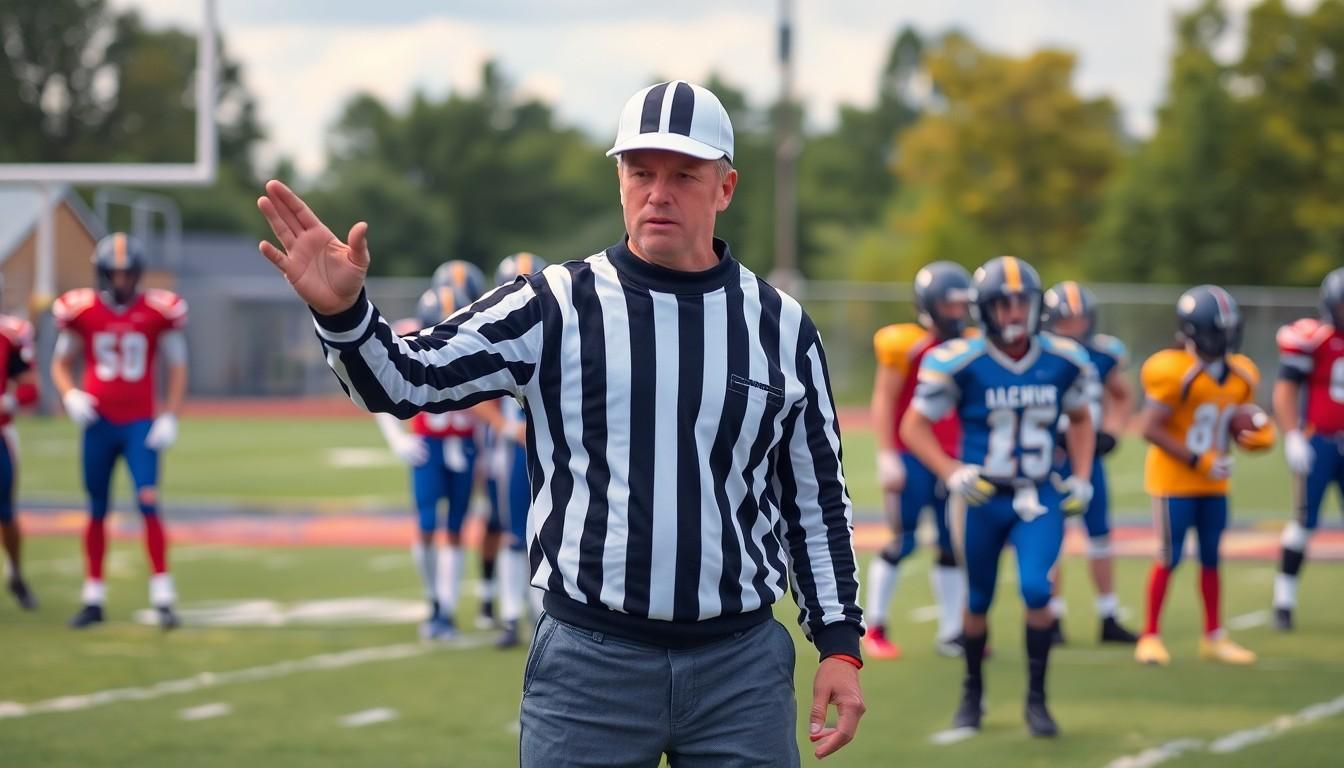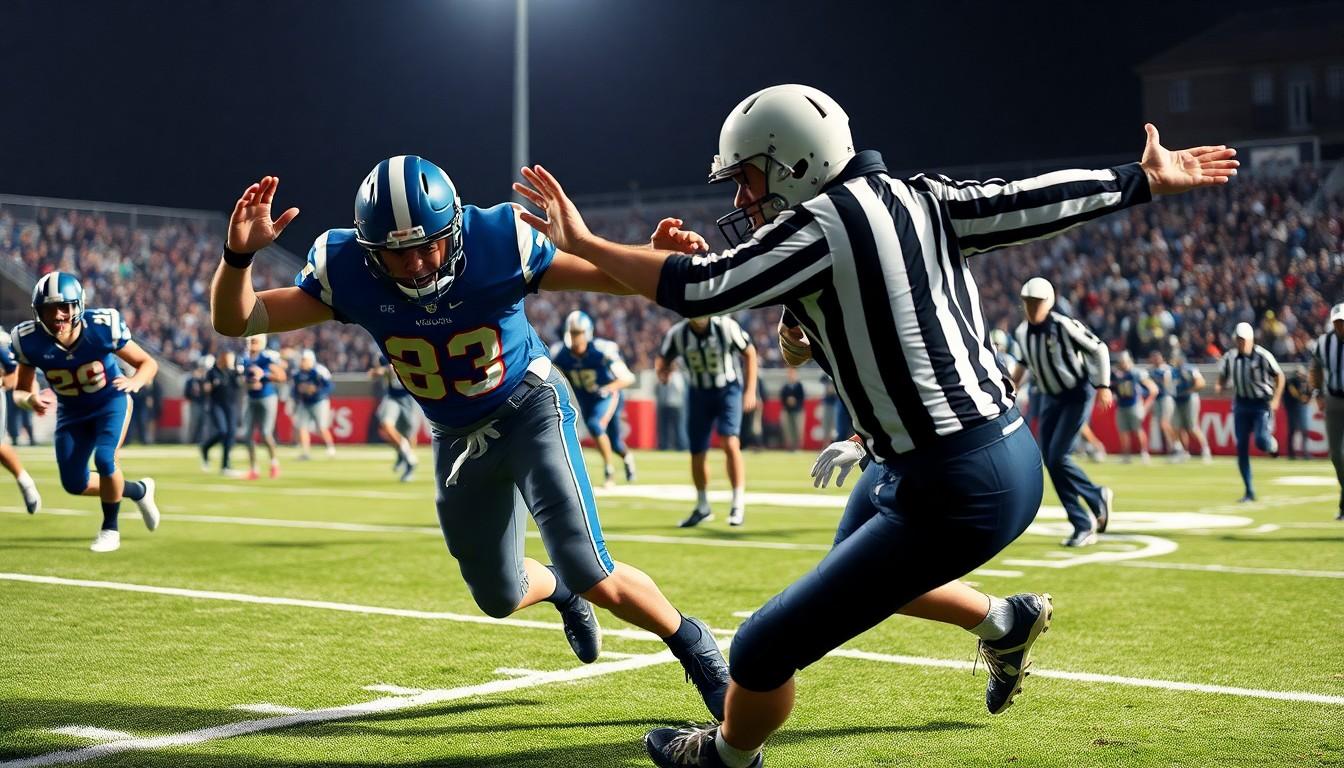In a world where sportsmanship reigns supreme, one high school football game took a wild turn that left everyone scratching their heads. Picture this: the crowd’s roaring, the players are pumped, and suddenly, a high school football player decides the referee needs a little more than just a whistle to keep things in line. Yes, you read that right—tackling the ref isn’t exactly on the playbook.
High School Football Player Tackles Ref
During a high school football game, a player unexpectedly tackled a referee, creating a chaotic scene that left spectators in shock. This incident unfolded while the game intensified, and tensions ran high on the field. The player, frustrated with a call made by the referee, acted out in a moment of aggression.
Players and coaches quickly reacted as the tackle occurred, with some attempting to intervene and pull the player away from the referee. Spectators expressed a mix of disbelief and concern, unsure of what they just witnessed. After the incident, officials stopped the game to restore order and assess the situation.
Consequently, the referee required medical attention following the tackle, highlighting the serious nature of the event. Local authorities and school officials launched an investigation to determine the circumstances leading up to this unprecedented action. They aimed to address safety protocols and ensure that such behavior wouldn’t be tolerated in the future.
As news of the incident spread, discussions erupted in the community regarding appropriate conduct in youth sports. Coaches and parents engaged in conversations about instilling respect for officials and promoting sportsmanship among players. This event served as a crucial reminder of the importance of maintaining composure and respect within competitive environments.
Background on High School Football

High school football represents a significant aspect of American sports culture. During games, players, coaches, and referees play vital roles in ensuring fair competition and maintaining sportsmanship.
Significance of Referees in Football
Referees serve critical functions in football by enforcing rules and maintaining order. Their presence ensures fair play, contributing to the integrity of the sport. Authority figures in the field, referees make instantaneous calls that can influence game outcomes. Respect for officials fosters a positive environment for all participants. By upholding rules, referees help teach players essential life skills such as discipline and respect for authority.
Common Challenges Faced by Referees
Referees regularly encounter numerous challenges while officiating games. Intense emotions during matches can lead to confrontations with players and coaches. Misunderstandings regarding calls often escalate tensions on the field. Limited resources, such as training and support, complicate their ability to perform effectively. Additionally, public scrutiny comes from fans and parents, adding extra pressure during games. These factors highlight the need for support systems that emphasize respect for officials and enhance the overall sports experience.
Analysis of the Incident
The confrontation during the high school football game shocked everyone involved. A player tackled the referee after expressing frustration over a call, escalating tensions significantly. This unexpected act created chaos on the field, causing immediate reactions from the audience and the team. Spectators gasped as they processed the scene, bewildered by the breakdown of sportsmanship.
Description of the Event
In a pivotal moment, the situation began when a disputed call added pressure on the player. During a critical play, he felt the referee misjudged a penalty, leading to frustration boiling over. With emotions high, he surged toward the official and lunged, resulting in a tackle that took everyone by surprise. Medical personnel attended to the referee promptly, reflecting the incident’s severity. The game came to an abrupt halt, leaving players and fans stunned as order was restored.
Reactions from Players and Coaches
Coaches quickly intervened, aiming to separate the player from the referee and calm the surrounding chaos. Players expressed disbelief over the incident, with many discussing the importance of maintaining sportsmanship. Coaches gathered their teams, reminding them of the values inherent in sports, such as respect and discipline. Some teammates voiced concern, emphasizing the need to handle frustrations constructively. This collective response highlighted a crucial teaching moment for the athletes, reinforcing the significance of composure even during intense competitions.
Implications of the Incident
The tackle of the referee by a high school football player raises significant concerns within the sports community.
Impact on the Players Involved
Players involved in the incident face immediate repercussions. Suspensions or expulsion from the team often result from such behavior. Their mental health also becomes a concern, as teammates and opponents may view them differently. Reevaluation of their sportsmanship and emotional regulation skills occurs in the wake of this event. Training sessions may focus on proper conflict resolution strategies, ensuring that players understand acceptable responses to grievances. Coaches emphasize the long-term implications of this behavior, reinforcing the need for respect towards officials and peers.
Consequences for Referees and Officials
Referees and officials experience heightened scrutiny following the incident. Many may reconsider their willingness to officiate youth games due to fears of confrontation. Injuries sustained during the tackle can lead to legal repercussions for the player, further impacting how officials approach their roles. Furthermore, the perception of safety becomes paramount, prompting leagues and schools to reassess protocols surrounding official interactions. Enhanced training for referees on conflict management emerges from this incident, leading to a push for improved communication during tense moments in games. Overall, this incident profoundly alters the landscape of youth sports officiating.
Broader Conversations in Sports
The incident of a player tackling a referee has ignited broader discussions within the sports community, specifically focusing on the conduct within youth sports.
Violence in Sports Culture
Violence in sports culture often emerges from intense competition and emotional investment. Incidents like this challenge the expectations of player behavior and safety. Many in the community express concerns that aggressive actions undermine the integrity of the game. Elevated emotions can quickly lead to conflict, making it essential to address underlying issues. Coaches, athletes, and parents play critical roles in shaping a culture that prioritizes safety over aggression. An ongoing dialogue about acceptable behavior can prevent future incidents. This situation emphasizes the necessity for comprehensive education about appropriate responses during tense moments.
Importance of Sportsmanship and Respect
Sportsmanship and respect are fundamental components of any athletic competition. Upholding these principles fosters a positive environment for players, coaches, and officials. Respect for referees and their decisions not only enhances the game but also instills lasting values in young athletes. Emphasizing sportsmanship supports healthy competition and teaches lessons that extend beyond the field. This incident serves as a stark reminder of the importance of these ideals. Consequently, programs that promote respect can cultivate a sense of accountability among players. Encouraging dialogue about sportsmanship creates a foundation for improved interactions during competitive situations.
Importance of Sportsmanship
The tackle of a referee by a high school football player serves as a stark reminder of the importance of sportsmanship in youth sports. This incident not only raised concerns about player conduct but also highlighted the need for better communication and conflict resolution strategies among athletes.
As discussions continue within the community about acceptable behavior, it’s crucial to prioritize respect for officials and uphold the integrity of the game. The repercussions faced by the player involved underscore the serious implications of such actions.
Moving forward, fostering an environment that emphasizes accountability and sportsmanship will be essential in shaping the future of youth athletics. By instilling these values, players can learn to navigate their emotions and maintain composure in high-pressure situations.

